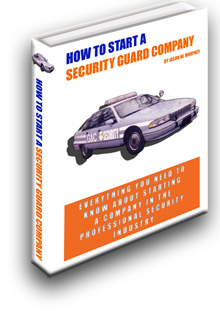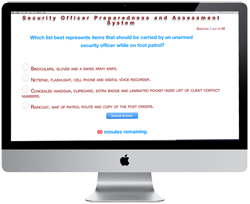 Practice Test
Training
Regulations
Security FAQs
Member Support
Sign In
Join
Practice Test
Training
Regulations
Security FAQs
Member Support
Sign In
Join

LAST EDIT May 24, 2023
Will a Criminal History Keep Me From Getting a Security Officer License?
Listen to Content From This Article.
As the author of the Unarmed Security Prep Guide and as the administrator of The Security Officer Network, here's an example of one of the more common questions I get.
I want to work security, but I've got a felony. What can I do?
I thought it might be a good idea for me to create this article to answer the question as best I can, and then, in the future, I can provide the link to this video to those who ask me this question.
So, will a criminal record keep you from getting a private security license?
So obviously, this varies by state. Each state has their own rules. I am not going to be able to answer for all states.
But stay tuned to the end of this article for a link to your state's specific regulatory entity so that you can find out how things are in your state.
First things first. Let's take a look at the process. Just because an applicant has a criminal history doesn't mean they will be automatically disqualified from consideration.
They will be required to disclose the criminal history, and if they don't, it will probably be uncovered in the background check that many states require as a condition of licensing.
Then the government employee who reviews your application will likely make a decision on whether or not you should be disqualified.
If your application is rejected, you will likely still have the ability to appeal the decision by going before the board that oversees the application process in your state.
Now that we understand the process, let's consider the types of offenses that are most problematic.
Minor offenses, especially those committed a long time ago, may not automatically disqualify an applicant. However, more serious crimes, particularly those involving violence, dishonesty or a breach of trust, could pose a significant barrier—especially if they were committed in recent years.
However, a state probably can't just ban any and every person with a criminal record from obtaining the ability to practice an occupation—including security. That's because there is case law in which judges have declared blanket bans to be unconstitutional due to the Constitution's "equal protection clause." Courts require states to recognize the differences in fitness and character of people with felony records and prevent states from making "irrational distinctions" between felonies and misdemeanors. To comply with the judges' interpretation of the equal protection clause, the state must consider the circumstances of the felon's life including rehabilitation, age at time of conviction, and other mitigating circumstances related to the nature of the crime and his participation in it.
For example, in Florida, an application will be denied if the applicant has been convicted of a felony during the previous 10 years. Felons must have had their civil right restored for a period of ten years before the state will consider moving forward with an application. Additionally, the application may still be denied if the applicant has been associated with certain types of crime ranging from trespassing to kidnapping. Or even if they have a tendency to exhibit lack of good moral character. To this extent, the state will ask the applicant if they abuse alcohol or have other substance abuse problems.
So, in Florida, a person with a criminal past, including a felony, can get authorization to work security, provided the crime is at least 10 years in his past. Essentially, the applicant should prepare to make the case that their criminal history is in their distant past and they have built a proven history of demonstrating a commitment to adhering to legal and ethical standards.
So, perhaps the applicant is unsure if his application would be successful. No one wants to pay the fees, take the training and go through the bureaucracy only to be rejected. If this is you, here's a neat suggestion. Ask your licensing entity if it provides a criminal history pre-screening process. This allows applicants to submit their criminal history to the regulatory department and allows the department to conduct a pre-determination of if they would or would not reject the applicant. This helps the applicant to avoid all of the hassle of submitting an application that's going to be rejected.
Also, if you have been denied before, do keep in mind that policies change. For example, in 2020 California laws were amended to require state authorities to "provide an opportunity" for a "second chance." The state's licensing board didn't anticipate that this would have much of an effect on their number of denials but those who have been rejected by the state's board might find that circumstances have now changed and should consider re-applying.
Of course, these changes go both ways. Maryland's newly updated statutes contain a reference to the applicant's history of "use of force." It's perhaps targeted at police officers and may reflect that state's policymakers' particular leanings towards potentially disqualifying police officers who have been fired from police departments for use of force issues.
As promised, here is that link to each state's regulatory agency. To learn more, navigate to your state agency and find their handbook or list of regulations and application form. Here you can likely review the specifics of your state.
Follow on Twitter at officerhq. This is a great way to stay in the know with the latest going on in the security industry. As a current or future security professional, it's your knowledge of the industry that allows you to stand out above the other security providers.
Join us at TheSecurityOfficerNetwork.com. It's here where you will build your professional portfolio, take and document your Security Officer Network training programs, and maintain your Network membership; the professional security officer's status symbol of choice.
Are you ready to start thinking about starting your own security company? Check out this 140 page ebook from The Security Officer Network entitled "How to Start A Security Guard Company". Get your PDF copy while it is still free! Or, order the paperback from Amazon.
How Much Does it Cost to Start a Security Guard Company - The initial investment that should be set aside before start a private security agency. Click to Read
How Much Can a New Security Agency Charge? - The new security agency's pricing strategy. Click to Read
What are the Components of the Security Guard Company Business Plan - The necessary elements of the Security Guard Company's business plan. Click to Read
How to Lower the Cost of the Securty Guard Company's Insurance Premiums - Methods for cutting the cost of insurance and undercutting the price model of the big security companies. Click to Read
How Much Should a Company Charge for Security Patrol? - Methods for charging for patrol route services. Click to Read

SecurityOfficerHQ.com is the exclusive provider of this free 57 page PDF guide. It features just about everything you need to know before taking the exam and includes The Professional Security Officer eCourse. You may get your copy for free right now only at SecurityOfficerHQ.com! Submit your name and email to receive your copy via email or click here to learn more about this guide.

SecurityOfficerHQ.com is the exclusive provider of this free 140 page PDF ebook. Less-comprehensive versions sell for $24, but, for the time being, you may get your copy for free right now only at SecurityOfficerHQ.com! Submit your name and email to receive your copy via email or click here to learn more about the book.

The forty question, free practice exam will test your unarmed security knowledge. It's the perfect test prep for those who must sit an exam before getting licensing.

This free job interview guide is the security officer's must-have resource. Get yours here.
© 2012 - 2026 The Security Officer Network
A Product of the 1918 Media Limited Liability Company
Addr: Thirty North Gould Street 2288
Sheridan, Wyoming 82801
Phone: (307) 461-6079
Red Hirundo Rustica Custom CMS and Testing Engine
Disclosures | Privacy | 307.461.6079